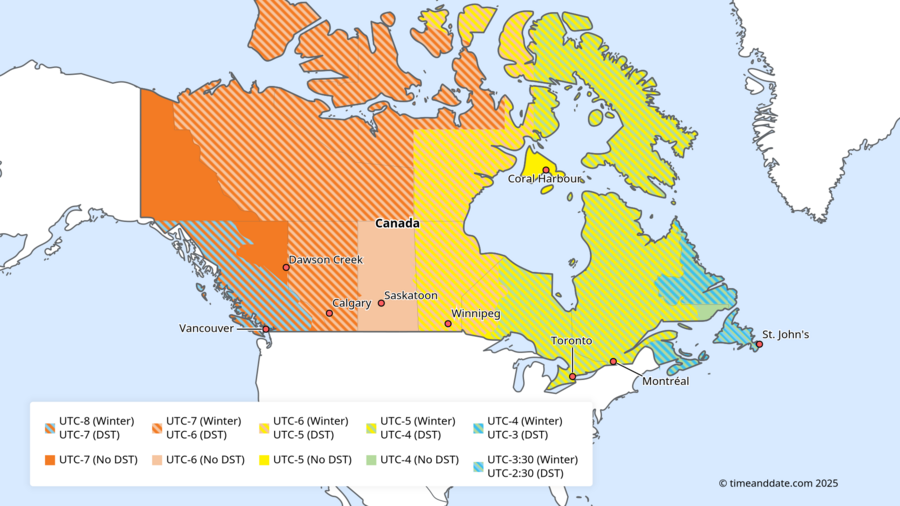
Most people living in Canada will set their clocks back one hour from 02:00 (2 am) to 01:00 (1 am) local time on Sunday, November 2, 2025.
Standard time, also known as winter time, will end on Sunday, March 8, 2026.
Canada clock change in detailMost of the United States will also end DST on the same date.
Longer than in Europe
In 2007, the United States and Canada implemented changes to “spring forward” earlier and “fall back” later. The change extended the Daylight Saving Time period to 238 days, giving Americans and Canadians more daylight hours in the evening for much of the year. In comparison, Daylight Saving Time in Europe is 21 or 28 days shorter than in the United States and Canada, depending on the calendar year.
In 2025, DST in Europe will end on October 26—one week before clocks change in most of Canada and the United States.
DST Change in Canada
Clocks will change in almost all areas in Canada, except:
Canada Moves Toward Ending Clock Changes
Several Canadian provinces, including British Columbia (BC), Ontario, and Alberta, have pushed to end Daylight Saving Time (DST), but progress remains slow.
In Quebec, a public consultation held in October 2024 gathered more than 214 000 responses, with 91% of participants saying they want to stop changing the clocks twice a year. Among those, 72% preferred keeping summer time year-round.
Quebec will make its own decision and isn’t bound by the choices of its neighbours.
Simon Jolin-Barrette, Quebec Justice Minister
globalnews.caThe government noted that further consultations are needed before any final decision is made.
BC introduced a legislation amendment in 2019 to stay on permanent DST, but is waiting for Washington, Oregon, and California to take action to maintain alignment.
Ontario passed the Time Amendment Act in 2020 to remain on DST year-round. But Ontario is unlikely to implement it until New York State and Quebec formalize their positions, again to ensure alignment on trade and other economic factors.
In 2021, Alberta held a referendum on abolishing the biannual time change. The public vote narrowly resulted in favor of retaining the system of adjusting clocks twice a year. 50.2% voted to continue changing clocks twice a year.
History of DST
Canada implemented DST as early as 1908, when the small towns of Port Arthur and Fort William (now part of Thunder Bay) became the first documented places in the world to adopt the practice.
Set clocks back or ahead?Other Locations That Change
Several other locations in the Atlantic region will also turn their clocks back on November 2, 2025—including Cuba, Bermuda, The Bahamas, Saint Pierre and Miquelon, and Thule Air Base in Greenland.
Upcoming DST changes